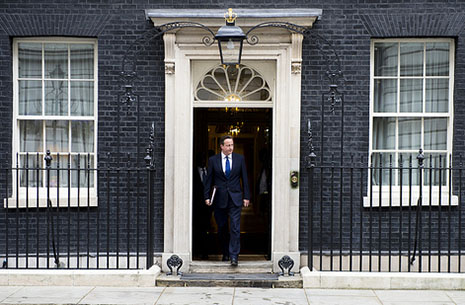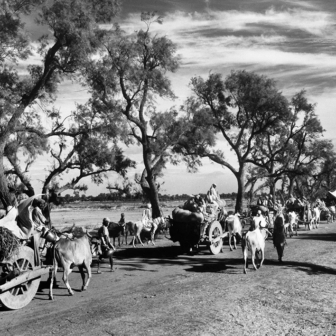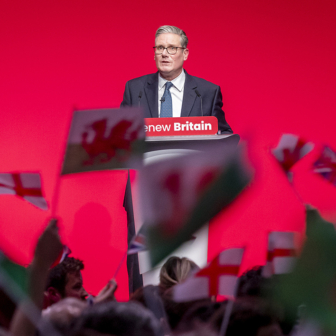RICHMAL Crompton’s William, a 1920s child of southeast England’s middle-class, semi-rural suburbia, was my first literary hero: obstinate and dishevelled, cunning and well-meaning, pedantic and rebellious. In one story, published in 1930, William and his loyal Outlaws, picking up scraps from parents’ dinner-table chatter, inspire the village children into electing their very own prime minister. The process is lively, the result never in doubt, but there’s an awkward moment at the declaration when a bold voice pipes up: “What’re you going to do for us?”
William is indignant to the folds of his rumpled socks – and nobody does indignation better. “Do for you? Do for you? I’m not going to do anything for you. I’m going to rule.”
It’s hard to imagine the preternaturally smooth David Cameron in the role. Yet there’s an echo of William, Prime Minister in a remark he made while the “hung parliament” election of 2010 still lay ahead. Asked in an interview that depth-charge question, why he wanted to be prime minister, Cameron replied: “Because I think I would be good at it.”
The jesting tone – though not the dangerous whiff of lordliness – fitted the Conservative Party leader’s then policy-light and charm-heavy approach to opposition. He believed that reassuring rhetoric, media-friendly presentation and sheer public weariness with a decade of Labour would be enough to “detoxify” the Tory brand and propel him into Downing Street. But the onset of financial crisis in 2007–08 suggested that an ingredient of a kind hitherto absent from Cameron’s public repertoire – seriousness, ballast, urgency – was needed to clinch the deal with voters. Even for a figure from central casting (the familiar Eton-Oxford path embellished by aristocratic lineage), merely arriving in a position to rule would no longer cut it. It was time to put that first in philosophy, politics and economics to good use and, without going all French on us, offer the public an idea – or at least, this being England, a slogan.
THIS was the context in which Cameron unveiled the theme that would underpin his electoral offering. There had been an augury during his campaign for the party leadership in 2005, when – effectively in riposte to Margaret Thatcher’s most notorious remark – he declared: “There is such a thing as society, it’s just not the same as the state.” The “Big Society” itself appeared in November 2009, in a lecture honouring the centre-left journalist Hugo Young. Indeed, the core argument – that a “reimagined state” must be used to “remake society” – was notable for its anti-poverty message, inclusive language and progressive references.
The political launch in March 2010, at the start of the election campaign, also reflected the occasion, with the “big idea” being framed as necessary to repairing the damage bequeathed by Labour. (The Conservative manifesto, reflecting the enthusiasms of Cameron’s now-departed strategist Steve Hilton, was even presented as an “invitation to join the government of Britain.”) The “Big Society” was now a “guiding philosophy – a society where the leading force for progress is social responsibility, not state control” and a “thread that runs consistently through our whole policy programme – our plans to reform public services, mend our broken society, and rebuild trust in politics.”
From the start, the public and media response mixed bemusement, scepticism, ridicule and outright hostility. (Polly Toynbee’s “warmed over Victorianism” was one of the politer comments – though, typically of critics, she conceded the “big society is a good idea.”) Undeterred, Cameron – now in office, albeit in coalition with the Liberal Democrats – returned to the subject with further lengthy iterations: in July 2010 (the Big Society is “about a huge culture change... a whole new approach to government and governing,” and building it is “my great passion”) and again in February 2011 (where the idea was redefined as “giving people more power and control to improve their lives and their communities,” with “responsibility” as “the absolute key”).
By now, the quotation marks around Big Society had long gone – leaving the portentous capitals to convey an assumed connection with its more distinguished ancestors: JFK’s New Frontier and LBJ’s Great Society. The very succession of high-profile “relaunches” meant that well into the coalition’s five-year term the Big Society still had the flavour of a smile without a cat – somewhat like Tony Blair’s Third Way, a less comforting precedent. Even among Conservatives, a notion took hold that this was “Cameron’s pet project,” reflecting the hucksterism of a former PR man (a seven-year stint in the industry had been his only pre-politics job).
But this was the least of it. The Big Society’s very catch-all quality – at once eye-catching slogan, brand extension, civic initiative and social band-aid – allowed Cameron’s political enemies to see it as an artful cover for a hard-right purpose: cutting public expenditure, especially on welfare, and thus spreading insecurity and imposing further hardship on Britain’s already poor citizens. In this view, economic crisis offered the ideal pretext for an ideology-led slash-and-burn project dressed in “voluntaristic” clothes: a pernicious invitation to the people to conspire in the destruction of the post-1945 social contract.
The circumstances of the Big Society’s birth made this interpretation both inevitable and plausible. True, the notion came swaddled with reference to the social liberalism of L.T. Hobhouse and J.A. Hobson in the early 1900s, to Elinor Ostrom on “governing the commons,” and to the civic conservatism of Edmund Burke and Michael Oakeshott. It was also elaborated at book length by the briefly fashionable communitarian Phillip Blond and the Conservative MP Jesse Norman (whose The Big Society: The Anatomy of the New Politics is a sophisticated exposition of a “shared vision of social and economic renewal”). But attached to a Conservative program committed to radical debt reduction at a time of financial stringency for many households, it was always going to be a tough sell to the anti-Tory majority.
IN THREE ways, though, the elusive Big Society was to survive its troubled infancy and, if not become the shaping idea Cameron hoped, then acquire at least some political and intellectual currency. First, several areas of government policy reflect its influence: a social investment bank (Big Society Capital), funding for social enterprise and community purchase of local amenities (such as pubs and shops), a voluntary “citizen service” for young people, devolving of work search and the probation service, support for parent-initiated “free schools,” and direct elections of the heads of regional police authorities. Second, the government’s welfare reforms – including a “bedroom tax,” changes to disability benefits, and more stringent criteria for accessing out-of-work payments – have withstood intense criticism (from Labour, the media, interest groups, and academics), and retain majority support.
But the evidence of improvement in both these areas remains meagre. Established agencies in the “third sector” view the Big Society’s impact in their field as negligible and dismiss the overblown claims made for it. (Stephen Bubb, head of a national association on volunteering, told David Cameron in January 2013 that Whitehall has “failed to communicate or implement it consistently,” and is now “irreparably damaged.”) Yet even the starkest index of distress, an increase in the number and use of “food banks,” can be turned – by the government’s presently dominant logic – to defend as well as attack the redirection of public policy. Negative attitudes towards social security recipients have intensified since the late 1980s, according to many polls, reinforcing the government’s case that an effort to transfer responsibility – by decree, tender, nudge, or a brutal “you’re on your own, chum” – goes with the social grain.
Here is the third indication of the Big Society’s staying power: the way that compelling ambiguity is at the heart of its allure. For example, it is flexible enough to accommodate a definite if amorphous shift in public life towards small-scale enterprise, local campaigning, self-help partnership and neighbourhood initiative. The process, often facilitated by new technology, includes community-run libraries and gardens, the startup hub around east London’s Old Street, and campaigns for the “living wage” and against fracking and the HS2 high-speed rail project. Those involved stretch from keen, appy striplings through mid-career diversifiers to boomers expelled from employment or liberated from marriage (or vice versa).
True, all this draws on strong pre-existing foundations, and its direct links with the Big Society are unclear. The same goes for some of the newish forms of expressive activism, from anti-corporate protest to the Occupy gatherings. Yet if one test of an idea is to be capacious without sinking, and even, as in the latter case, to get its adversaries to define themselves against it, then Cameron’s may have unexpected resilience – if only in the story he sells, though that can count for a lot in modern politics.
SO, TOP-DOWN catalysis meets bottom-up transformation, and creates a happy union? Well, governments (and oppositions) too can dream. But to be ultra-literal in a very William-like way, the nature of the UK state itself stands against the larger goals of the Big Society: in its sclerotic tools and instincts; in its lack of a strategic institutional culture; in its predisposition to work as denier, not enabler; in its incoherence over fundamentals where consensus is essential; and in the infirmity of local authorities, which should be an active partner in any such ambitious project.
Britain’s systemic core is kingly to its bone marrow, and even when its ideas are, or could be, “right,” it suffers from a rooted suspicion (amply reciprocated) of its subjects. As a result, wider social change in this country tends to rub against the state’s efforts to capture it, to outrun any direction from above, and eventually to force a new accommodation. A conscriptive approach to their own tolerant good nature can rouse these subjects to discover their inner citizen and force their masters to think again. This is a healthy democratic corrective but equally not a route to the Big Society.
The pity of it all is that, to adapt Gertrude Stein, there is a there, there. The Big Society’s affinity with earlier currents in England’s rich history of voluntary association provides further evidence. It’s there in the left’s pre-statist traditions of mutualism, cooperation, and guild socialism, which Labour’s “Blue Labour“ tendency is seeking to refurbish. It’s there in “community-centred policies” such as localism, social capital and active citizenship, which Anne Power tracks. It’s there in the work of thinkers such as Colin Ward, who in Anarchy in Action sketched a “plausible future” of people “making their own niche in the world of ordinary needs and their satisfaction.” The British state is not, however, going to embrace the rich resources of “popular self-activity” and become the vehicle of a genuine movement towards “social self-determination.” It may be induced to support, to grant, to devolve, and in all this to improve lives; but its understanding of sovereign authority limits its capacity to govern well, far less to achieve promised transformation.
William, Prime Minister ends with the elected leader, overburdened by the demands of his public, walking away. “I’m sick of being prime minister. I’m sick of politics altogether. There isn’t any sense in them. I’ll give up being prime minister to you and you can start doing things.”
This is more Big Society than the Big Society. Again, David Cameron is an unlikely candidate to step into William’s mud-spattered shoes. But Cameron can take suitably ambiguous guidance from his imaginary predecessor. His passion has deep roots in England’s political soil. But to nurture them you may have to let go. •




